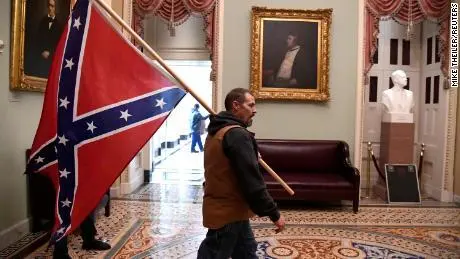
In his Open Yale Lectures, #CivilWar historian David Blight contrasts two quotes by the president #Confederacy Jefferson Davis:
“The recent declaration of the candidate and leaders of the Black Republican Party must suffice to convince many who have formerly doubted the purpose to attack the institution of slavery in the states. The undying opposition to slavery in the United States means war upon it, where it is, not where it is not.”
"Slavery was in no wise the cause of the conflict but only an incident."
The first quote is from a speech in 1861. Davis was insisting that the Republican opposition to slavery in the territories was a ruse, and that the "Black Republicans" would be coming for #slavery in the states, all in the service of secession. The second quote is from Davis' 1882 memoir/history of the war. A bit of a gap had opened over 20 years.
That gap is part of what historians call "The #LostCause," the romantic narrative of southern victimhood. As a narrative, the Lost Cause has dozens of bits and pieces, but I'd say that there are three main pillars: 1) The war was not about slavery, 2) the South fought honorably and fairly while the North was dishonorable and cruel (AKA Robert E. Lee was a saint/Ulysses S. Grant was a butcher), 3) Reconstruction was incompetent tyranny.
As Blight explains in Race and Reunion, the Lost Cause was the dominant narrative in the south for over a century. Even unsympathetic historians ended up adopting some of its ideas in a spirit of reconciliation and getting on with business. It remains a strong force in American culture.
(Aside: I was an undergrad in the mid-nineties. I remember hearing a professor expounding one of the tropes; the idea that slavery wasn't profitable and was doomed to failure, and therefore the war was actually counterproductive. That trope should have died in the 60s, when historians started looking at the southern ledger books. For a dying industry, slave-run cotton plantations were making incredible amounts of money.)
So far, the best overview and debunking of the Lost Cause that I've found is Edward Bonekemper's The Myth of the Lost Cause: Why the South Fought the Civil War and Why the North Won.
The Civil War is one of America's big three periods of historical study (the others being the Revolutionary War and WWII). It's a crowded field and so most authors specialize. Bonekemper's work is one of the few I've found that tries to give an overview of the arguments and deal with whole categories. It doesn't deal with Reconstruction (Eric Foner has that locked up anyway) but does deal with the questions of why the war was fought and how it was fought.
My favorite sections are the ones dealing with the myth of Robert E. Lee. Bonekemper rolls his eyes at historians who have presented Lee as a "combination of King Arthur and Jesus". He traces the #history of the hagiography, pointing out that historians immediately after the war were less impressed. He brings up the dissenting voices that pointed out Lee's strategic blunders, such as ignoring the western theater, being overly aggressive when defense was called for, and being unaware of even the very condition of his own army.
Bonekemper also introduces Grady McWhiney and Perry D. Jamieson's Attack and Die a kind of crunchy stats analysis of Grant and Lee that shows Grant achieving victory with only 15% total losses in major battles vs. Lee's defeat with 20%, upending the usual mantra that Grant was a butcher who threw away his men. This is the kind of scholarship that frequently goes overlooked in public discussions.
Naturally, the late Bonekemper couldn't completely keep up with the arguments. There's just too much material. For example, he asserts that England might have come to the aid of the Confederacy. But historians looking at British archives have found that Prime Minister Palmerston wanted to stay out of it. Palmerston was fond of boxing, so his quip was, "They who in quarrels interpose, will often get a bloody nose." There's no evidence that his government was willing to spend blood and treasure over the Confederacy. Diplomacy was an option, but Lincoln was probably Palmerston's match there.
That in mind, "The Myth of the Lost Cause" is still the best work I've found tackling the issue of the lost cause. If you - like me - grew up in an area where people talked unironically about "The War of Yankee Aggression," it's worth a look.

